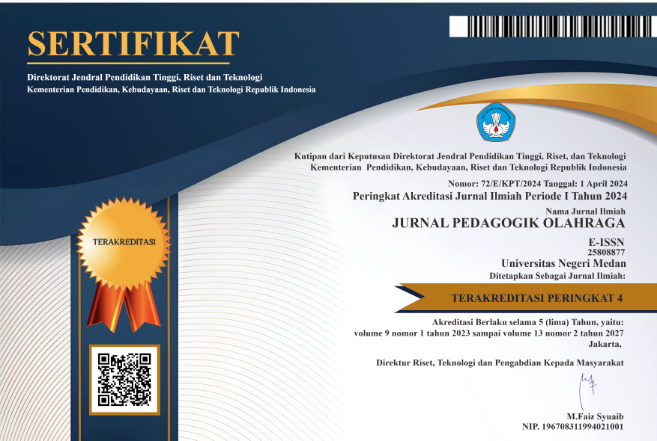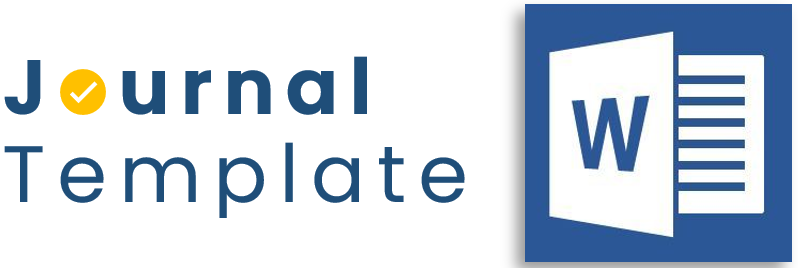DIMENSI PSIKOSOSIAL BERDASARKAN PARTISIPASI DALAM EKSTRAKURIKULER OLAHRAGA DAN KEMAMPUAN MOTORIK (Studi Korelasional di MAN 3 Sukabumi)
DOI:
https://doi.org/10.24114/jpor.v11i1.67578Keywords:
Partisipasi Olahraga, Ekstrakurikuler, Kemampuan Motorik, Masalah Psikososial,Abstract
This study aims to examine the relationship between participation in sports extracurricular activities and motor skills with psychosocial problems among students at MAN 3 Sukabumi. Adolescence is a developmental phase that is vulnerable to various psychological pressures, making it important to explore the role of physical activity in supporting mental well-being. This research uses a quantitative correlational approach with a sample of 35 students selected through purposive sampling based on specific criteria. The instruments used include the Pediatric Symptom Checklist (PSC-35) to measure psychosocial problems, the Barrow Motor Ability Test to assess motor skills, and a participation questionnaire to measure students’ level of involvement in sports activities. The questionnaire consists of six indicators: attendance, active involvement, having a goal, providing feedback, sharing information, taking responsibility, and perceiving benefits. Data analysis was conducted using the Statistical Package for the Social Sciences (SPSS) version 25, through descriptive statistics, normality test, linearity test, and multiple correlation analysis. The results showed a significant negative relationship between participation in sports extracurricular activities and motor skills with students’ psychosocial problems. Participation had a correlation of r = -0.388 (p = 0.021), while motor skills had a correlation of r = -0.409 (p = 0.015). Regression analysis showed that both variables simultaneously contributed 31.9% to psychosocial problems (R² = 0.319; p = 0.002). In conclusion, the higher the level of student participation in sports activities and the better their motor skills, the lower the level of psychosocial problems they experience.References
Bisa, M. (2019). Tinjauan Sosiologis Olahraga Dan Anak-Anak. Jurnal Fisioterapi Dan Rehabilitasi, 3(2), 48–61. https://doi.org/10.33660/jfrwhs.v3i2.76
Budiman, & Ruslan Rusmana. (2021). Pengaruh Kegiatan Ekstrakurikuler Olahraga Terhadap Perkembangan Life Skills Siswa. Jurnal Kejaora (Kesehatan Jasmani Dan Olah Raga), 6(2), 306–314. https://doi.org/10.36526/kejaora.v6i2.1557
Cantika, D., Tohar, A. A., & Khairi, Z. (2024). Membangun Harga Diri: Upaya Penguatan Pendidikan Karakter Remaja. IJEDR: Indonesian Journal of Education and Development Research, 2(2), 1271–1280. https://doi.org/10.57235/ijedr.v2i2.2569
Gould, D., & Carson, S. (2008). International Review of Sport and Exercise Psychology. International Review of Sport and Exercise Psychology, 1(1), 58–78. https://doi.org/10.1080/17509840701834573
M. Ghazwa Isha Firdaus, Ibnu Sina, Raden Akhmad Atqoo, Khofif Fauzi, Yogi Nurrohim, & Galih Septiansyah Firdaus. (2025). Pengaruh Olahraga Terhadap Kesehatan Mental Siswa Sekolah Menengah Di Smkn 2 Pandeglang. Jurnal Ilmiah Multidisiplin Ilmu, 2(3), 101–105. https://doi.org/10.69714/jybavn59
Mira Santika Samaloisa. (2024). KETERLAMBATAN PERKEMBANGAN MOTORIK ANAK AKIBAT KURANGNYA ASUPAN GIZ.
Nurhayati, T. (2016). Perkembangan Perilaku Psikososial pada masa Pubertas. Journal of Chemical Information and Modeling, 53(9), 1689–1699.
Pascoe, M., Bailey, A. P., Craike, M., Carter, T., Patten, R., Stepto, N., & Parker, A. (2020). Physical activity and exercise in youth mental health promotion: A scoping review. BMJ Open Sport and Exercise Medicine, 6(1), 1–11. https://doi.org/10.1136/bmjsem-2019-000677
Rebar, A. L., Stanton, R., Geard, D., Short, C., Duncan, M. J., & Vandelanotte, C. (2015). A meta-meta-analysis of the effect of physical activity on depression and anxiety in non-clinical adult populations. Health Psychology Review, 9(3), 366–378. https://doi.org/10.1080/17437199.2015.1022901
Sarfika, R., Wenny, B. P., Putri, D. E., Refnandes, R., Fernandes, F., Freska, W., & Rahayuningsih, A. (2024). Pemberian Pendidikan Kesehatan Tumbuh Kembang Psikososial Pada Remaja Sebagai Upaya Mencegah Masalah Kesehatan Mental. JMM (Jurnal Masyarakat Mandiri), 8(1), 95. https://doi.org/10.31764/jmm.v8i1.19619
Sobh, Z. M. (2020). Identity Among Adolescent Arab-Americans in Dearborn, Michigan: An Eriksonian Perspective. In University of Michigan-Dearborn (Vol. 20).
Suherly Dina Saputra, A., & Syamsul taufik, M. (2019). Korelasi Antara Motor Ability Dengan Keterampilan Dasar Bermain Bola Voli Pada Siswa Berusia 18-19. Maenpo, 9(1), 30. https://doi.org/10.35194/jm.v9i1.906
Suryana, E., Hasdikurniati, A. I., Harmayanti, A. A., & Harto, K. (2022). Perkembangan Remaja Awal, Menengah Dan Implikasinya Terhadap Pendidikan. Jurnal Ilmiah Mandala Education, 8(3), 1917–1928. https://doi.org/10.58258/jime.v8i3.3494
Wang, W., Li, W., & Yao, J. (2024). The Relationship between Participation in Extracurricular Arts and Sports Activities and Adolescents’ Social and Emotional Skills: An Empirical Analysis Based on the OECD Social and Emotional Skills Survey. Behavioral Sciences, 14(7), 541. https://doi.org/10.3390/bs14070541
Wiyono, D. M., & Sumpena, A. (2018). Survey on Student Motivation and Participation in Futsal Extracurricular. 2(229), 842–848. https://doi.org/10.5220/0007071808420848
Yasunaga, M., Miyaguchi, H., Ishizuki, C., Kita, Y., & Nakai, A. (2024). Association between Motor Skills, Occupational Performance, and Mental Health in Japanese Children with Neurodevelopmental Disorders: A Cross-Sectional Correlational Study. Children, 11(8). https://doi.org/10.3390/children11080899
Downloads
Published
How to Cite
Issue
Section
License

This work is licensed under a Creative Commons Attribution 4.0 International License.
Jurnal Pedagogik Olahraga is licensed under a Creative Commons Attribution 4.0 International License
Penulis yang menerbitkan jurnal ini menyetujui persyaratan berikut:
- Penulis memegang hak cipta dan memberikan hak jurnal untuk publikasi pertama dengan karya yang dilisensikan secara bersamaan di bawah Lisensi Atribusi Creative Commons yang memungkinkan orang lain untuk membagikan karya tersebut dengan pengakuan atas penulisan karya dan publikasi awal dalam jurnal ini.
- Penulis dapat membuat pengaturan kontrak tambahan yang terpisah untuk distribusi non-eksklusif dari versi terbitan jurnal dari karya tersebut (misalnya, mempostingnya ke penyimpanan institusional atau menerbitkannya dalam sebuah buku), dengan pengakuan dari publikasi awalnya di jurnal ini.
- Penulis diizinkan dan didorong untuk memposting karya mereka secara online (misalnya, di repositori institusional atau di situs web mereka) sebelum dan selama proses pengiriman, karena hal itu dapat mengarah pada pertukaran yang produktif, serta kutipan yang lebih awal dan lebih besar dari karya yang diterbitkan.









